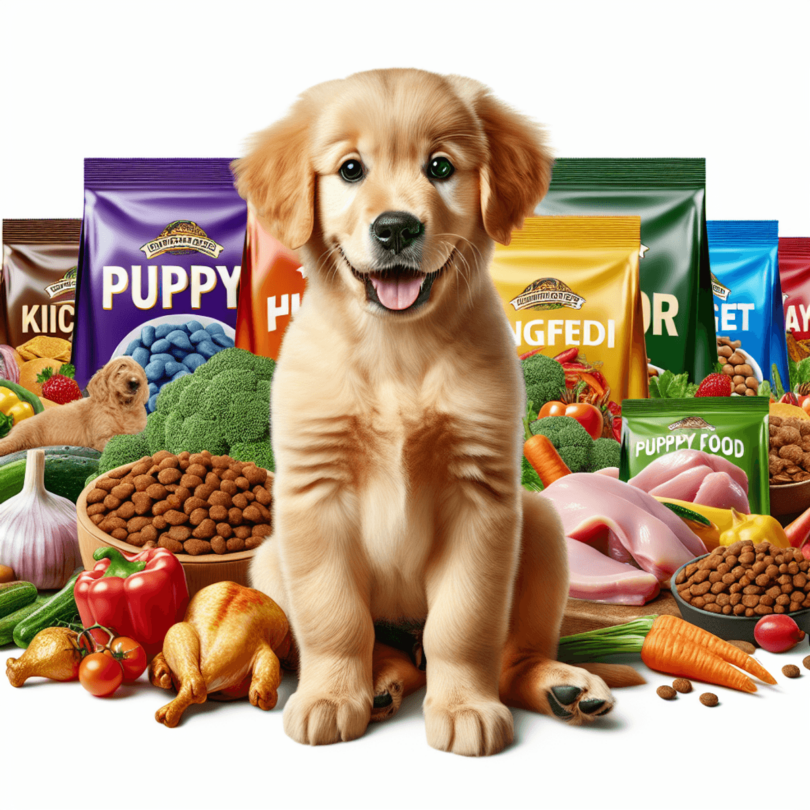Selecting the right puppy food is like choosing the best school for your child—it’s crucial for their development and happiness. In 2024, veterinarians have spotlighted five top-tier puppy foods that stand out in terms of nutrition and overall health benefits.
Here’s a sneak peek at these recommended picks:
- Hill’s Science Diet
- Royal Canin
- Purina Pro Plan
- IAMS Proactive Health
- The Farmer’s Dog
Why is it so important to get this choice right? Puppies require specific nutrients to support their rapid growth and boundless energy. The perfect blend of protein, fats, vitamins, and minerals ensures they grow into healthy adults. For those looking to adopt a new furry friend, Lens And Leash offers fantastic resources on pet adoption and care.
Understanding Puppy Nutritional Needs
Puppies are bundles of energy and joy, but they also have specific nutritional requirements that differ drastically from adult dogs. Ensuring they get the right nutrients is crucial for their growth and overall health.
The Significance of High-Protein and Fat Content in Puppy Food
Puppies need a diet rich in protein and fat to fuel their rapid growth and active lifestyles. Proteins provide the essential amino acids necessary for muscle development, tissue repair, and immune function. High-quality protein sources include:
- Chicken
- Fish
- Beef
- Lamb
Fat serves as a dense source of energy, which growing puppies need in abundance. It also aids in the absorption of fat-soluble vitamins (A, D, E, and K). Look for puppy foods that list healthy fats such as omega-3 and omega-6 fatty acids.

Essential Nutrients for Healthy Growth
Certain nutrients play a pivotal role in your puppy’s development:
- DHA (Docosahexaenoic Acid): This omega-3 fatty acid supports brain development and vision.
- Calcium: Vital for strong bones and teeth.
- Phosphorus: Works in conjunction with calcium to ensure proper skeletal development.
Incorporating these nutrients into your puppy’s diet can help mitigate future health issues like hip dysplasia or poor vision.
Differences Between Puppy and Adult Dog Food
Puppy food isn’t just a smaller kibble version of adult dog food; it’s formulated differently to meet the unique needs of growing dogs. Here are some key differences:
- Higher Caloric Density: Puppies burn through calories faster due to their higher activity levels.
- Increased Protein Content: Aimed at supporting rapid muscle growth.
- Balanced Calcium-to-Phosphorus Ratio: Ensures proper bone development without causing skeletal abnormalities.
Choosing a diet specifically tailored for puppies ensures they receive the right balance of nutrients to thrive during their early stages of life. Always check the packaging to confirm it meets the nutritional requirements for puppies as outlined by the Association of American Feed Control Officials (AAFCO).
Understanding these nutritional needs sets the stage for making informed decisions about your puppy’s diet, ensuring they grow into happy, healthy adults.
The Role of Veterinarians in Puppy Nutrition
Veterinarians are like the superheroes of the puppy world, swooping in to save the day with their expert advice on nutrition. When it comes to assessing a puppy’s dietary needs, they consider several factors:
- Breed: Different breeds have unique nutritional requirements. For example, a Jack Russell Terrier might need a different diet compared to an American Bulldog.
- Age and Weight: Puppies grow at different rates, and their food intake should match their growth spurts.
- Activity Level: An energetic Australian Cattle Dog will require more calories than a laid-back Shih Tzu.
Common Health Issues Impacting Dietary Choices
Health issues can significantly influence feeding guidelines for puppies. Here are a few common concerns:
- Sensitive Stomachs: Puppies with sensitive stomachs may need special vet recommended puppy food that is easy to digest and free from common allergens.
- Tip: Look for labels that mention “limited ingredient” or “hypoallergenic.”
- Breed-Specific Needs: Some breeds are prone to particular health problems. The Cane Corso, for instance, might benefit from a diet rich in joint-supporting nutrients like glucosamine and chondroitin.
- Fun Fact: Did you know that Siberian Huskies like Thunder often have unique dietary needs due to their high energy levels?
Veterinarians also keep an eye out for other health issues such as dental problems, skin allergies, and weight management challenges. Their goal is to recommend the best possible diet that aligns with your puppy’s specific health profile.
Why Vet Recommended Puppy Food Matters
Choosing vet recommended puppy food ensures you’re giving your furry friend a balanced diet tailored to their needs. These foods typically meet AAFCO standards and contain high-quality ingredients without unnecessary fillers or artificial colors.
In summary, veterinarians play a crucial role in guiding pet owners through the maze of puppy nutrition. Their expertise helps ensure that your little furball grows up healthy, happy, and ready for all the adventures life has to offer!
Criteria for Selecting the Best Puppy Food
Choosing the perfect puppy food can feel overwhelming with so many options available. Here’s a simpler guide to help you make the right choice.
Importance of Meeting AAFCO Standards
Always look for puppy food that meets AAFCO standards. The Association of American Feed Control Officials (AAFCO) ensures that pet foods meet minimum nutritional requirements. This stamp of approval indicates that the food is balanced and complete, providing your pup with essential nutrients for growth and development.
Key Ingredients to Avoid
Not all puppy foods are created equal. Some contain ingredients that can be harmful or just plain useless. Steer clear of:
- Fillers: Corn, soy, and wheat often act as cheap fillers with little nutritional value.
- Artificial Colors: Puppies don’t care about the color of their food; these dyes can lead to allergies and other health issues.
- By-products: While not necessarily harmful, meat by-products can be lower in quality compared to whole meats.
Balancing Quality with Cost
Finding high-quality puppy food that doesn’t break the bank is possible! Here are some tips:
- Read Labels: Look for whole meats listed as the first ingredient. If you see “chicken,” “beef,” or “fish” at the top of the list, you’re on the right track.
- Buy in Bulk: Larger bags are often more cost-effective.
- Coupons and Sales: Many brands offer discounts or loyalty programs.
Budget-Friendly Options
Quality doesn’t have to mean expensive. Brands like IAMS Proactive Health offer nutritious options without draining your wallet. Look for deals at pet stores or online retailers to snag these budget-friendly gems.
Selecting puppy food might seem daunting, but keeping an eye out for AAFCO standards, dodging harmful ingredients, and balancing cost with quality will guide you through this delicious journey. Your pup will thank you with wagging tails and happy barks!
Top 5 Puppy Foods Recommended by Vets in 2024
1. Hill’s Science Diet
Hill’s Science Diet stands tall as a top choice among veterinarians for puppy food in 2024. Crafted with a science-backed formulation, this brand ensures that your puppy gets the best start in life.
Formulation Tailored for Puppies
Hill’s Science Diet is specifically designed to cater to the unique nutritional needs of puppies. The recipe is rich in high-quality protein, primarily from chicken, which supports muscle development and growth. It also includes an optimal balance of vitamins and minerals.
Key ingredients include:
- DHA from fish oil, promoting healthy brain and eye development.
- Calcium and phosphorus, essential for building strong bones and teeth.
- A blend of antioxidants and vitamins C + E to support a robust immune system.
Benefits for Small and Large Breeds
This brand doesn’t adopt a one-size-fits-all approach. Hill’s Science Diet offers tailored formulations for different breeds:
- Small Breed Puppy Formula: Contains smaller kibble size, making it easier for tiny mouths to chew. It’s packed with more calories per bite to meet the energy requirements of small, active puppies.
- Large Breed Puppy Formula: Features controlled levels of calcium to ensure proper bone growth. This minimizes the risk of developmental orthopedic diseases common in larger breeds.
Veterinarians often recommend Hill’s Science Diet due to its rigorous quality control measures and commitment to using only high-quality ingredients without fillers or artificial preservatives.
2. Royal Canin
Royal Canin is another stellar option that makes it onto the vet-approved list. Known for its breed-specific formulas, this brand goes above and beyond in catering to the diverse needs of puppies based on their size, breed, and health requirements.
Breed-Specific Options
Royal Canin provides tailored nutrition plans for various breeds such as:
- Labrador Retriever Puppy Food
- German Shepherd Puppy Food
- Chihuahua Puppy Food
Each formula addresses specific health concerns common to these breeds, ensuring optimized nutrition.
Nutritional Advantages
Royal Canin’s puppy foods are fortified with:
- Prebiotics and highly digestible proteins to support digestive health.
- Precise energy content tailored to prevent excessive weight gain.
- Balanced mineral content fostering robust skeletal development.
3. Purina Pro Plan
Purina Pro Plan offers a comprehensive range of formulations that cater to the specific dietary needs of growing puppies.
Range of Formulations
From sensitive stomachs to high-energy puppies, Purina Pro Plan has it all:
- Pro Plan Puppy Sensitive Skin & Stomach
- Pro Plan Sport Performance 30/20
These formulas ensure that regardless of your puppy’s individual needs, there’s a nutritious option available.
Importance of Growth Rates
Purina Pro Plan focuses on providing balanced nutrition without overloading on unnecessary fillers. Their formulas include:
- High-quality protein sources like real chicken or salmon.
- DHA from omega-rich fish oil for brain development.
- Antioxidants supporting immune system health.
4. IAMS Proactive Health
IAMS Proactive Health offers significant benefits aimed at supporting mental and visual development while being budget-friendly.
Mental & Visual Development
IAMS includes important nutrients such as:
- Omega fatty acids promoting brain health.
- Vitamin E aiding in visual acuity.
Value Proposition
Ideal for cost-conscious pet owners who don’t want to compromise on quality, IAMS Proactive Health delivers excellent value with its nutrient-rich formulas at an affordable price point.
5. The Farmer’s Dog
The Farmer’s Dog sets itself apart by offering fresh food options formulated under the guidance of veterinary nutritionists.
Fresh vs Traditional Dog Foods
Fresh foods offer multiple benefits over traditional kibbles:
- Higher moisture content aiding in hydration.
- Minimal processing preserving nutrient integrity.
Veterinary Nutritionist Involvement
Every meal plan from The Farmer
2. Royal Canin
When it comes to variety, Royal Canin stands out with its impressive range of options tailored for specific dog breeds. Whether you have a tiny Chihuahua or a strong German Shepherd, Royal Canin has specially designed formulas to meet the unique needs of different breeds.
Breed-Specific Options:
- Chihuahua Puppy: Designed to support the delicate digestive system and small jaws.
- Labrador Retriever Puppy: Specially formulated to promote healthy joints and maintain optimal weight.
The nutritional advantages of Royal Canin go beyond just breed-specific formulas:
Size Matters
From small toy breeds to large giants, Royal Canin offers size-specific formulas ensuring each puppy receives the exact nutrients they require.
Diverse Diets
Not only catering to specific breeds but also considering their life stage and health requirements, Royal Canin’s range includes options for sensitive stomachs, high energy levels, and even dental health.
Nutritional Benefits:
- Balanced Nutrition: High-quality proteins, prebiotics, and antioxidants support overall health and development.
- DHA & EPA: Critical for brain development and visual acuity in growing puppies.
- Calcium & Phosphorus: Essential minerals for bone strength and growth.
Royal Canin’s commitment to precise nutrition makes it an excellent choice for ensuring your puppy flourishes during their early months. With such targeted formulations, you can trust that your furry friend is receiving the best start in life.
3. Purina Pro Plan
Purina Pro Plan is a standout choice for puppies, offering a diverse range of formulations specifically designed to cater to various dietary needs. Whether your puppy has a sensitive stomach, requires hypoallergenic ingredients, or needs a high-energy diet, Purina Pro Plan has a product tailored to meet those needs.
Key benefits include:
- Range of Formulations: From the Focus series targeting specific health concerns to the Savor line promising exceptional taste and nutrition, there’s something for every pup.
- Growth Rates and Ingredient Quality: Ensuring optimal growth rates is crucial for puppies. Purina Pro Plan includes high-quality proteins like real chicken and salmon, supporting healthy muscle development and overall growth.
Puppy-specific formulas are enriched with DHA from omega-rich fish oil, promoting brain and vision development. The inclusion of antioxidants supports developing immune systems, making this brand an excellent choice as your puppy grows into a healthy adult dog.
4. IAMS Proactive Health
When it comes to supporting the mental and visual development of your puppy, IAMS Proactive Health stands out in the crowd. This brand is known for its thoughtfully crafted formulations that cater specifically to the unique needs of growing puppies. One of the key ingredients in IAMS Proactive Health is DHA, an omega-3 fatty acid essential for brain and eye development. Puppies fed with DHA-enriched food often show better cognitive function and sharper vision.
Value Proposition for Cost-Conscious Pet Owners:
- High-quality protein sourced from chicken and eggs.
- No fillers or artificial preservatives.
- Balanced blend of fibers and prebiotics for healthy digestion.
For pet owners looking to balance quality with cost, IAMS Proactive Health offers a compelling option without compromising on essential nutrients. It’s designed to be budget-friendly while ensuring that your furry friend gets all the benefits needed for a healthy start in life.
Why Vets Recommend It:
Vets appreciate IAMS for its consistency in delivering nutritional value at a reasonable price point. This makes it accessible for many pet owners who want to give their puppies a strong start without breaking the bank.
“IAMS Proactive Health provides an excellent balance of affordability and high-quality nutrition, making it a go-to recommendation for many veterinarians.”
With options tailored to different breed sizes, this brand ensures that every puppy receives age-appropriate nutrients crucial for their development stages.
5. The Farmer’s Dog
When it comes to fresh, human-grade dog food, The Farmer’s Dog stands out in the crowd. Unlike traditional kibble, which is often heavily processed, The Farmer’s Dog offers fresh meals that are cooked at low temperatures to retain nutrients and flavor.
Unique Aspects of Fresh vs. Traditional Dog Foods:
- Nutrient Retention: Fresh foods maintain more of their natural vitamins and minerals compared to kibble.
- Palatability: Many dogs find fresh food more appetizing, which can be particularly beneficial for picky eaters.
- Digestibility: Fresh ingredients are often easier on a puppy’s digestive system.
Veterinary Nutritionist Involvement in Meal Development:
The Farmer’s Dog collaborates with veterinary nutritionists to develop balanced meals tailored to your puppy’s specific needs. This involvement ensures that every meal is nutritionally complete, meeting AAFCO standards for puppy growth and development.
- Personalization: Meals are customized based on your puppy’s age, breed, weight, activity level, and health concerns.
- Quality Ingredients: Only high-quality meats and vegetables are used, free from fillers and artificial additives.
Switching to fresh food like The Farmer’s Dog can be a game-changer for your furry friend’s health and happiness.
Special Considerations for Puppies with Sensitive Stomachs
Puppies, like humans, can have sensitive stomachs that make mealtime a bit more complicated. Identifying and understanding these issues early is crucial for their health and happiness.
Identifying Signs of Digestive Distress in Puppies
A few signs can indicate your puppy might have a sensitive stomach:
- Frequent Diarrhea or Loose Stools: Consistent changes in stool consistency may signal digestive distress.
- Vomiting: Occasional vomiting is normal, but frequent episodes should raise concern.
- Excessive Gas: While some flatulence is expected, excessive gas might point to food intolerance.
- Lethargy: Lack of energy after meals could indicate discomfort or poor digestion.
- Poor Coat Condition: A dull coat or excessive shedding can be linked to nutritional deficiencies from improper digestion.
Recommended Brands/Formulas that Cater to Sensitive Stomachs
The good news is that several brands offer specialized formulations designed for puppies with delicate tummies. Here are a few top recommendations:
- Hill’s Science Diet Puppy Sensitive Stomach & Skin
- Formulation: Made with easy-to-digest ingredients and prebiotic fiber.
- Benefits: Supports digestive health and a shiny coat.
- Purina Pro Plan Focus Puppy Sensitive Skin & Stomach
- Formulation: Salmon as the first ingredient, combined with rice and oatmeal.
- Benefits: Gentle on the stomach while providing essential nutrients.
- Blue Buffalo Basics Limited Ingredient Puppy Formula
- Formulation: Limited ingredients to reduce the risk of food sensitivities.
- Benefits: Easily digestible protein sources and pumpkin for gentle digestion.
- Royal Canin Gastrointestinal Puppy Dry Dog Food
- Formulation: Specifically crafted for puppies with digestive issues.
- Benefits: High energy content and easily digestible proteins.
- Nutro Ultra Puppy
- Formulation: Trio of proteins from chicken, lamb, and salmon; contains whole grains and fruits.
- Benefits: Promotes balanced nutrition while being gentle on the stomach.
When choosing puppy food for sensitive stomachs, closely monitor how your puppy responds to new diets. Consulting your veterinarian ensures you select the most suitable option tailored to your pup’s specific needs.
Paying attention to your puppy’s growth and diet transitioning phase will ensure ongoing health benefits as they mature into adulthood.
Monitoring Your Puppy’s Growth and Diet Transitioning Phase
Keeping tabs on your puppy’s growth is key to ensuring they develop into a healthy adult dog. Understanding the body condition score (BCS) method can be super helpful here. This scoring system ranges from 1 (emaciated) to 9 (obese), with 4-5 being ideal for most pups.
How to Monitor Growth Rates Effectively
- Regular Weigh-Ins: Weigh your puppy every couple of weeks. A consistent increase in weight is a good indicator of healthy growth.
- Visual and Tactile Checks: Run your hands along your pup’s ribs. You should be able to feel them without pressing too hard, but they shouldn’t be visible.
- Body Condition Score Chart: Use a BCS chart available from your vet or online resources. Assess whether your puppy falls within the ideal range by looking at their waistline and tummy tuck.
Tip: Keep a growth journal noting their weight, BCS score, and any dietary changes.
Guidelines on Transitioning from Puppy Food to Adult Dog Food Gradually
Transitioning your pup from puppy food to adult dog food is not just a flip of a switch; it requires careful planning:
- Age Matters: Most vets recommend starting the transition when your puppy is about one year old, although this can vary depending on breed and size.
- Gradual Introduction:
- Days 1-3: Mix 25% adult dog food with 75% puppy food.
- Days 4-6: Increase the adult food to 50%, reducing the puppy food to 50%.
- Days 7-9: Mix 75% adult food with 25% puppy food.
- Day 10 Onwards: Full transition to adult dog food.
- Monitor for Reactions: Keep an eye out for any digestive issues such as diarrhea or vomiting during this phase. If problems arise, slow down the transition process.
Note: Always consult with your veterinarian before making any significant changes to your puppy’s diet.
Balancing these aspects ensures that your furry friend grows up strong and healthy, ready for all the adventures life has in store!
Conclusion: Choosing the Right Puppy Food is Essential for Their Health and Well-being!
Ensuring your puppy gets the best start in life hinges on the food you choose. Selecting the right puppy food isn’t just about what’s on the label; it’s about understanding their unique needs and preferences.
Here’s a quick recap of why consulting with your vet is crucial:
- Customized Dietary Plans: Vets can provide personalized advice based on your puppy’s breed, age, and health status.
- Health Monitoring: Regular check-ups help catch any dietary-related issues early, ensuring your pup grows up strong and healthy.
- Expert Insights: Leverage their expertise to navigate through the myriad of options available, avoiding common pitfalls like fillers and artificial additives.
Remember, every pup is different, and what works for one might not work for another. Your vet is your best ally in making informed choices tailored to your furry friend’s needs. Happy feeding! 🐾
FAQs (Frequently Asked Questions)
What are the top 5 puppy foods recommended by vets in 2024?
The top 5 puppy foods recommended by vets in 2024 are Hill’s Science Diet, Royal Canin, Purina Pro Plan, IAMS Proactive Health, and The Farmer’s Dog.
Why is it important to select the right puppy food?
Selecting the right puppy food is crucial for your furry friend’s healthy growth and development. Proper nutrition supports their overall health, energy levels, and can help prevent future health issues.
What are the nutritional requirements for puppies?
Puppies have specific nutritional requirements that include high protein and fat content for energy and growth. Essential nutrients such as DHA, calcium, and phosphorus are vital for healthy development during their growth stages.
How do veterinarians assess a puppy’s dietary needs?
Veterinarians assess a puppy’s dietary needs by considering factors such as age, breed, size, activity level, and any common health issues like sensitive stomachs or breed-specific dietary requirements.
What criteria should I consider when selecting the best puppy food?
When selecting the best puppy food, consider AAFCO standards for nutritional adequacy, key ingredients to avoid (such as fillers and artificial colors), and finding budget-friendly options that do not compromise on quality.
How can I monitor my puppy’s growth and transition to adult food?
You can monitor your puppy’s growth effectively using a body condition scoring method. Gradually transition from puppy food to adult dog food by mixing both types over a period of time to avoid digestive upset.









